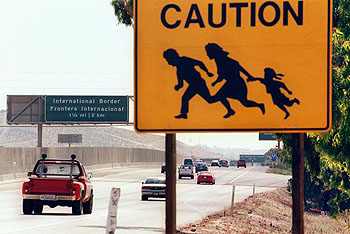I’ve been paying only moderate attention to the whole issue of President Obama’s executive order on immigration, and it’s only over the past few days that I’ve started trying to learn more about the legal issues involved. And I confess that I’ve been a little surprised by what I’ve discovered. As near as I can tell, both liberal and conservative legal scholars—as opposed to TV talking heads and other professional  rabble-rousers—agree that Obama has the authority to reshape immigration enforcement in nearly any way he wants to. Here are answers to five key questions about the legality of the immigration plan Obama announced tonight:
rabble-rousers—agree that Obama has the authority to reshape immigration enforcement in nearly any way he wants to. Here are answers to five key questions about the legality of the immigration plan Obama announced tonight:
- The linchpin of Obama’s executive action is the president’s inherent authority to engage in prosecutorial discretion, and just about everyone agrees that this authority is nearly unconditional. Speaking to a meeting of the conservative Federalist Society, Christopher Schroeder said: “I think the roots of prosecutorial discretion are extremely deep. The practice is long and robust. The case law is robust.” Erwin Chemerinsky and Samuel Kleiner agree: “It has always been within the president’s discretion to decide whether to have the Department of Justice enforce a particular law. As the Supreme Court declared in United States v. Nixon, ‘the Executive Branch has exclusive authority and absolute discretion to decide whether to prosecute a case.'”
- OK, but exempting entire categories of people from prosecution? It turns out that current immigration law explicitly recognizes this. Margaret Stock, a Republican immigration lawyer and a Federalist Society member, says: “The Immigration and Nationality Act and other laws are chock-full of huge grants of statutory authority to the president. Congress gave the president all these powers, and now they are upset because he wants to use them. Other presidents have used the same authority in the past without an outcry.”
- But are those grants really broad enough? Apparently so. In fact, immigration law provides the president an unusually broad scope for executive action. Eric Posner writes: “The president’s authority over this arena is even greater than his authority over other areas of the law….In 2012, the Supreme Court recognized the vast discretion of the president over immigration policy. In the case Arizona v. United States, the court struck down several Arizona laws that ordered state officials to enforce federal immigration laws, on pain of state penalty….As [Adam] Cox puts it, in a recent academic article, the court’s reasoning “gives executive branch officials near complete control over the content of immigration law.'”
- Still, even if this is true in theory, is it really true in practice? As it turns out, yes, there’s plenty of prior precedent for exactly this kind of thing. As the LA Times reports, “Obama would not be the first president to push through immigration reform by working outside of Congress.” In fact, presidents from FDR through Bill Clinton have issued executive orders that deferred deportation for various categories of undocumented immigrants. And while it’s true that Obama’s action will likely affect more people than any of the previous ones, that’s a political issue, not a legal one. From a strictly legal viewpoint, Obama is doing something that has plenty of past precedent.
- Finally, what about work permits? Even if Obama can legally defer prosecution—a right conferred by both constitutional authority and statutory language—does that also give him the right to issue work permits to immigrants affected by his order? Surprisingly, perhaps, that has a long pedigree too—one that goes back not just to DACA (Obama’s 2012 mini-DREAM executive order), but well before that. David Leopold, former president of the American Immigration Lawyers Association, explains: “The federal regulations governing employment under immigration law existed well before DACA. Under those regulations, any undocumented immigrant granted deferred action — under programs that preceded DACA or coincide with it — had already been able to apply for employment authorization….The president’s authority to grant work status long precedes DACA, and while it does apply to DACA and would apply to its expansion, it is not a direct outgrowth or creation of either.”
It’s an open question whether Obama’s actions are politically wise. It might force Republicans into an uncomfortable corner as they compete loudly to denounce Obama’s actions, further damaging their chances of appealing to Hispanics in future elections. Alternatively, it might poison any possibility of working constructively with congressional Republicans over the next couple of years, which might further degrade Democratic approval ratings. There’s also, I think, a legitimate question about whether liberals should be cheering an expansion of presidential power, whether it’s legal or not.
That said, Obama’s actions really do appear to be not just legal, but fairly uncontroversially so among people who know both the law and past precedent. Republicans may not like what Obama is doing, and they certainly have every right to fight it. But they should stop spouting nonsense about lawlessness and tyranny. That’s just playground silliness.













